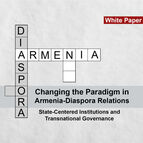

There are several million Greeks living in North America, Western Europe, Oceania and Africa. In the United States, the Greek lobby has gradually become a credible political force, alongside the Armenian lobby. What are the specificities of the Greek diaspora model? This is part four of a series of studies on State-Diaspora relations.
The Greek diaspora existed even before the rise of the nation state. French historian Michel Bruneau said that early on the necessity to establish a policy of the Greek state toward the diaspora was clear. Greek political thought categorizes the population living within the borders of the Greek and Cypriot states by Helladic Hellenism (Elladikos Ellinismos) and the Greek communities living in historical territories not part of modern day Greece, especially Bulgaria, southern Albania, and North Macedonia by Unredeemed Hellenism (Alyotrotos Ellinismos) which is formed by Hellenism of the Diaspora. Between 1970 and the end of the 2000s, Greece had ceased to be a country of emigration and became one of immigration. In the 1980s, discourse around the diaspora appeared as a subject of concern in Greek society and political life, and in particular Greek demography, taking into account the fall in population and the increasing rise in the living standards of Greek citizens.
Politics of the Greek Nation State With Regard to the Diaspora
What is striking in the Greek case is that the diaspora preceded the state, established in 1821. Greek diasporan intellectuals pushed forward the national revival movement against the Ottoman occupation at the beginning of the 19th century These included G. A. Koraïs in Paris and the Philili Etaira movement which had its headquarters in Odessa, the volunteers of which left to fight for the country during the successive conflicts which ravaged Greece in the 20th century. In the Greek case, the Greek and Cypriot states together form a two-headed metropolis.
Although the necessity of establishing a policy of the Greek state was acknowledged early on, it took a long time to enact it. Throughout the 21st century, Greece, which was not a wealthy country, established consulates and vice-consulates where the Greek population was large enough to justify their funding.
In the 1950s and 1960s, in the aftermath of the civil war, the Greek government realized the need to implement a policy vis-a-vis the diaspora as the country desperately needed its economic and political support. This is not only because of the difficulties which Greece faced after the Second World War, but also because it aligned with its policy of territorial expansion in the Balkan peninsula and in the islands of the Aegean, as well as the need to settle and integrate more than one million Greek refugees from Asia Minor and Eastern Thrace. This policy, which appeared after the Greek Civil War (1944-1947), was aimed at preventing the loss of identity among Greeks in North America, who were seen as at risk of assimilation, and to encourage them to provide economic aid to an ailing Greece. The policy did not take on precedence until the 1980s and 1990s, when state institutions were created to develop ties with the diaspora including the General Secretariat for Greeks Abroad and the World Council of Hellenes Abroad. In order for those institutions to fully fulfill their roles of organizing and coordinating networks of a globalized Greek nation, they would need to be truly independent from the Greek government ––now virtually their sole source of funds.
In fact, Diasporic Greeks have largely contributed to Greece’s economic development in the past: in 1956, 76% of Greece’s resources came from the navy and emigrants and only 13% from tourism.[1] In 1947, a Directorate of Greeks Abroad and Migration was created in the Ministry of Foreign Affairs, an advisory body that was charged with dealing with issues concerning Greeks abroad, including their economic, political, religious and educational life. A congress bringing together representatives of diasporic Greek communities to discuss the same issues was established, with a high council formed of members appointed for three years. This included a president of five Greek communities abroad (Cairo, Chicago, Sydney, Buenos Aires and Paris), representatives of the Greek chambers of commerce abroad (Alexandria, New York and Marseille) as well as two personalities recognized for their competence on the problems of Greeks abroad.
In 1954, the High Council of Greeks Abroad was created with 18 members appointed by the Minister of Foreign Affairs. The Council, however, came across the problem of Greek dual nationals and the potential for double allegiance of Greek nationals of the United States. The High Council has not been able to hold a congress to date.
The Greek Orthodox Church, as as nationalist and centralist force within state-diaspora relations, is a vector of Hellenism in the diaspora. During the Greek Junta (1967-1974), a body for dealing with issues around Greeks abroad was created at the Ministry of Foreign Affairs. The authorities entrusted the Social Science Research Center (EKKE) with the task of compiling the first directory of Greek organizations abroad in 1972. In 1975, reforms to the Greek constitution formalized the organic link between Greeks abroad and the Greek state: a late recognition of the existence of the diaspora in the constitutional text. A significant step was taken with the establishment in 1983 of the Secretariat of Greeks abroad and the creation in successive governments of a deputy minister of foreign affairs with the charge to manage issues around Greeks living in the diaspora.
A Consultative Body: The World Council of Greeks Abroad
Under the auspices of the Greek parliament, a Special Permanent Committee for Diaspora Greeks––a permanent committee composed of 30 members of parliament charged with promoting cooperation among diaspora Greeks, represents the Greek parliament in an official capacity vis-a-vis Greeks abroad. Its remit includes Greek nationals living abroad as well as foreign nationals of Greek origin. It is also meant to work with the General Secretariat of Greeks Abroad and the World Council of Hellenes Abroad. The World Council of Hellenes Abroad operates under the supervision of the Secretariat for Greeks Abroad, which appoints its members and decides on its convocation every two years in Thessaloniki and its executive committee. The Council of Greeks Abroad (SAE) is formed by representatives of more than 3,000 Greek communities and associations abroad. It acts as an advisory body to the Greek government on issues relating to the diaspora, including emigration and repatriation. In 1996, it listed 2,877 registered organizations, parishes, various associations and federations.
Although the American-Greek diaspora retains a prominent role within this body, Stefanos Tamvakis, a Greek from Egypt, was elected as the new president of the Council in December 2006. The Council of Greeks Abroad is the main representative body for people of Greek descent who reside abroad. Similar to the other diaspora-focused bodies, its statutory commitments lie with both Greek nationals abroad and non-nationals of Greek descent. The organization’s stated goal is “to bring together Greeks of the Diaspora creating a global network aimed at planning and carrying out programs for the benefit of the Omogeneia (Greek migrants and their descendants).” Members can be community organizations abroad, assemblies of Greek community parishes – further reflecting the important role of the Greek Orthodox Church, and other influential expatriate organizations. Elections take place every four years and representatives from all member organizations vote for their regional representatives in the Council’s geographical branches – roughly one per continent, as well as for the President of the World Council. Upon its creation, the World Council was recognized by a Decree of Greece’s President as the main advisory and consultative body of the Greek diaspora toward the Greek state. Delegations of representatives are chosen during regular elections at the level of “world regions”. Consultation takes place in the form of annual reports to the Greek parliament and irregular hearings and consultations. Thousands of Greek organizations, and associations abroad participate in it, and the Greek Orthodox Church and its network support it.
Toward a New Paradigm
To date, the activity report of this Council has fallen short of expectations. Aside from an overall lack of means and political will, there is also the impact of nationalist and centralizing conceptions of how relations of the Greek state with its diaspora should be managed. Moreover, the importance of the Greek Orthodox Church which sees itself as the guardian of Hellenism in the diaspora is increasingly out of touch with the diaspora in the context of globalization and the unprecedented economic crisis which began in 2009 and negatively impacted the country.
Moreover, with the more recent emigration of Greeks from Greece, we are witnessing a shift within the definition of Hellenism. From 2020, Greeks living abroad can vote in elections. Until the 2000s, the Greek diaspora was comprised of Greeks from places outside Greece, for example descendents of Greeks from Pontus, Eastern Thrace and Asia Minor who came from the former Soviet Union. Thus a need has been identified to update the idea of Hellenism from the way it was elaborated in the 20th century which aimed simply to preserve Hellenism in the diaspora and fight against assimilation. Globalization requires the Greek State to update its policies vis-à-vis its diaspora.
This turning point in the policy of the Greek State towards its diaspora is concomitant with an awareness provoked by an important migratory wave from the former USSR of Pontic Greeks including from Georgia, Armenia, and Ukraine, of which between 200,000-300,000 came to Greece between 1989 and 1995. Greece’s state institutions do not have the necessary capacity to develop horizontal relations between the different bodies of the diaspora and the state, to develop synergies, interactions and solidarities. We are thus moving toward a more “classic” policy of social protection for Greeks abroad, including access to health care and pensions through Greek consulates.
Footnotes:
1-Bruneau Michel. Politiques de l’État-nation grec vis-à-vis de la diaspora. In: Revue européenne des migrations internationales, vol. 17, n°3,2001. pp. 9-22.
Also see
Diaspora Models, Part 3: Israel
What are the tools available to Israel that strengthen the synergies between Tel Aviv and Diasporan Jews? This is part three of a series of studies on State–Diaspora relations.
Read moreDiaspora Models, Part 2: Portugal
In this article, journalist Tigran Yegavian looks at how Portugal has developed effective tools to strengthen its relationship with its diaspora and assert its international presence.
Read moreDiaspora Models, Part 1: Switzerland
As prosperous as Switzerland is, it has long been and remains a country of emigration, however, there are a number of structures available to Swiss communities abroad to ensure an optimal relationship with the country of origin.
Read moreRelated reading
Why We Fail at Utilizing the Diaspora’s Potential
Since the 2020 Artsakh War, discussions about Armenia-Diaspora collaboration have become more active. Through his own personal experience, scientist Hrant Khachatrian lays out his vision for effective cooperation.
Read moreChanging the Paradigm in Armenia-Diaspora Relations
How should Armenia-Diaspora relations develop moving forward? This new White Paper argues that relations must be defined through state-centered institutions and transnational governance.
Read moreThe Intellectual Crisis of the Armenian Reality
Varak Ketsemanian presents a critical analysis of Sona B. Dadoyan’s work, “2015, The Armenian Condition in Hindsight and Foresight: A Discourse,” a timely and critical piece of scholarship that sheds light on the intellectual crisis of the 21st century Armenian reality.
Read more






